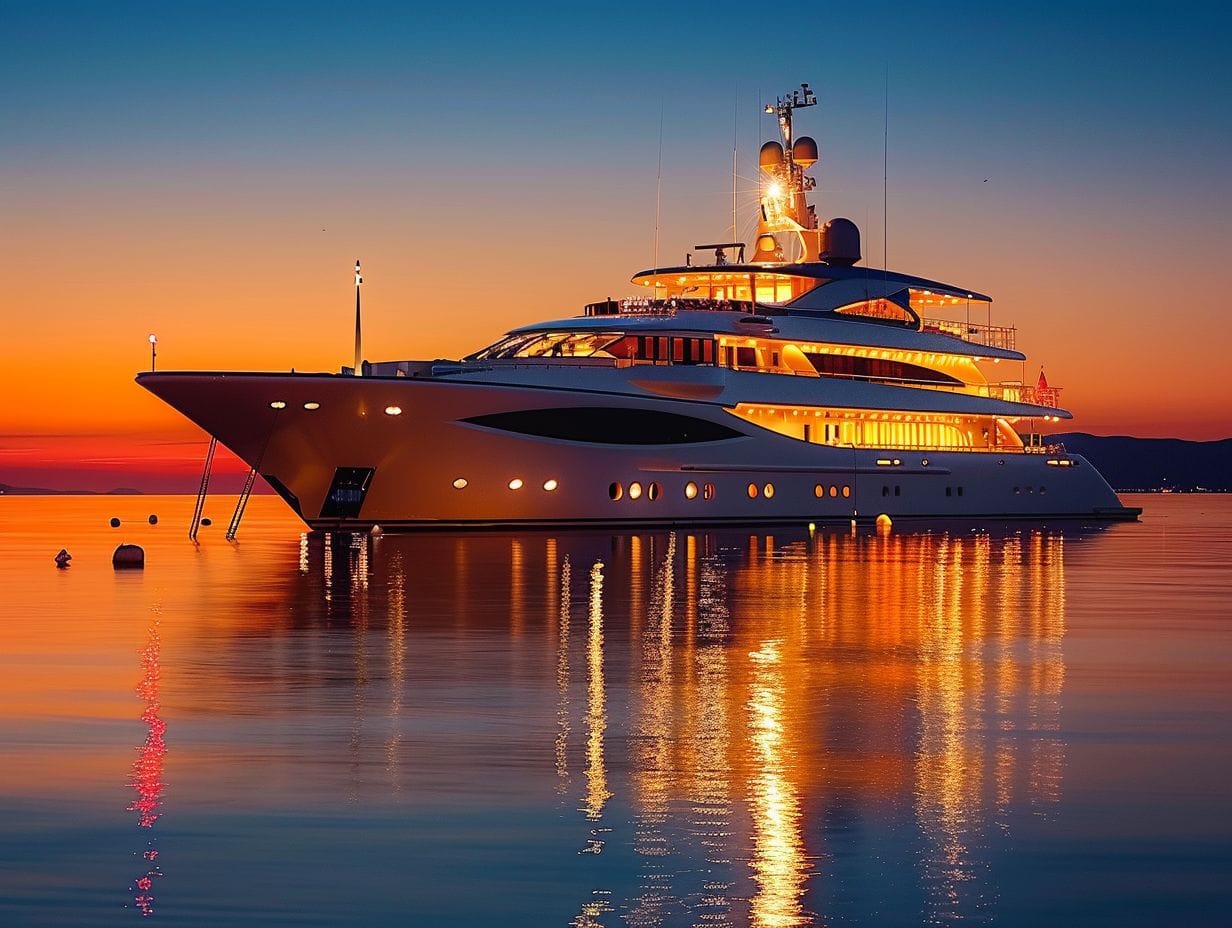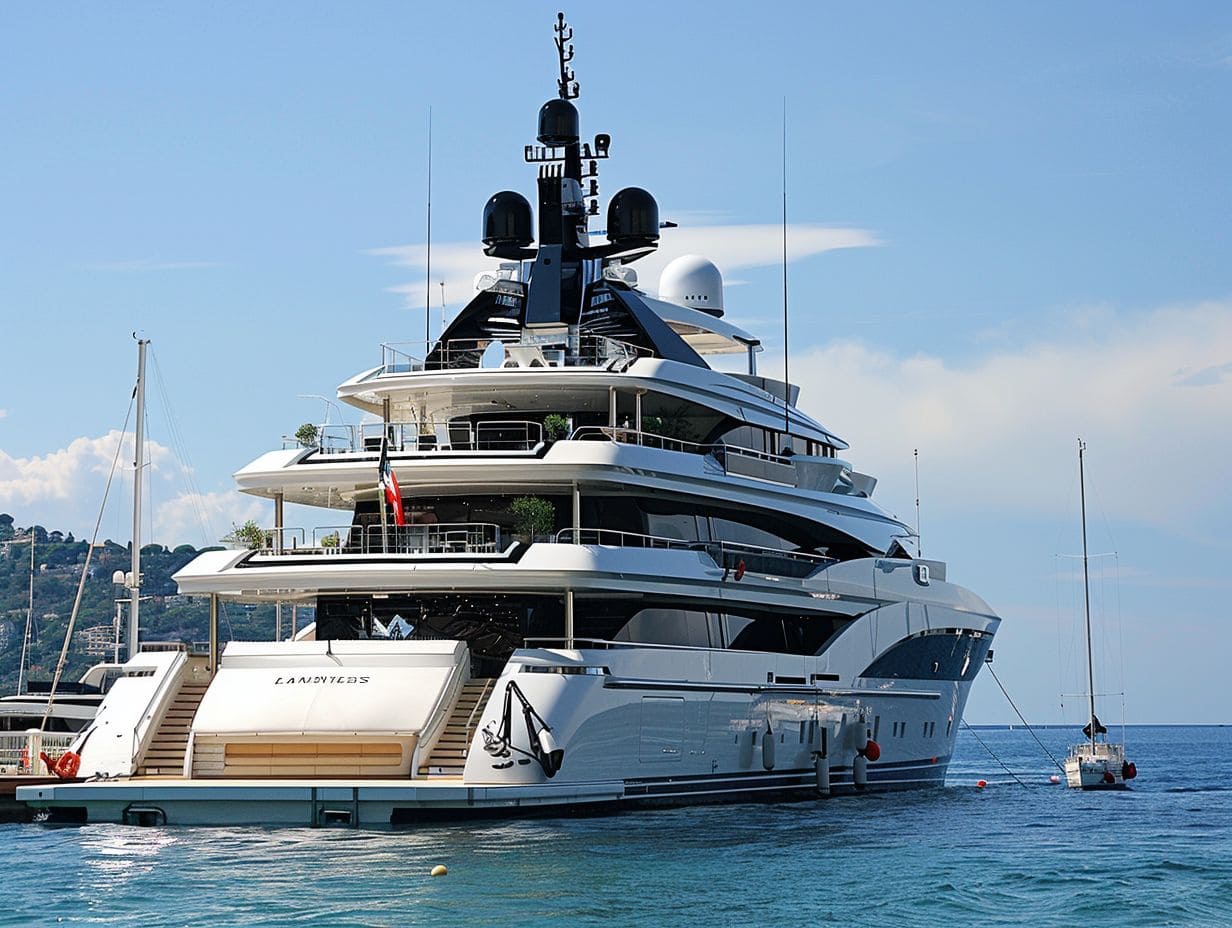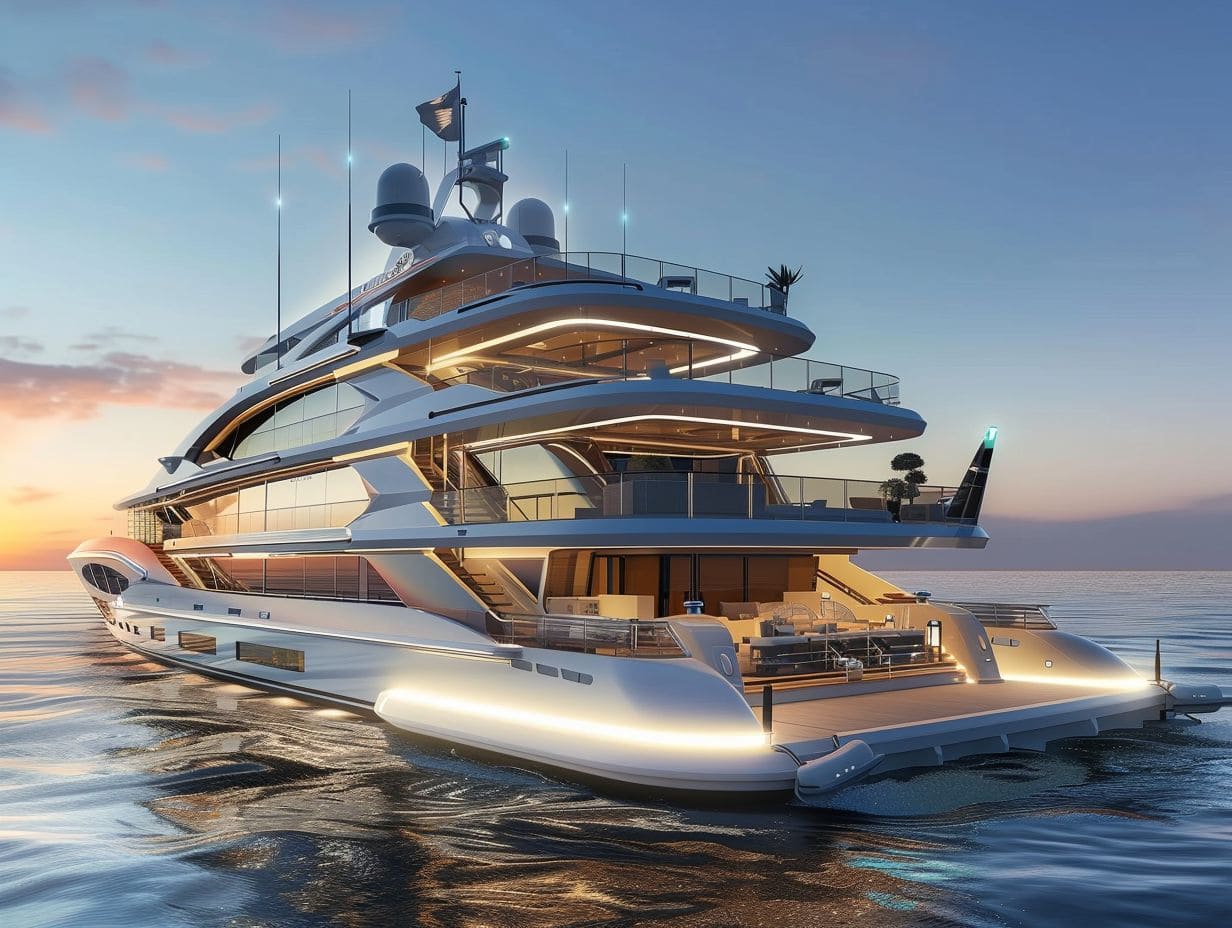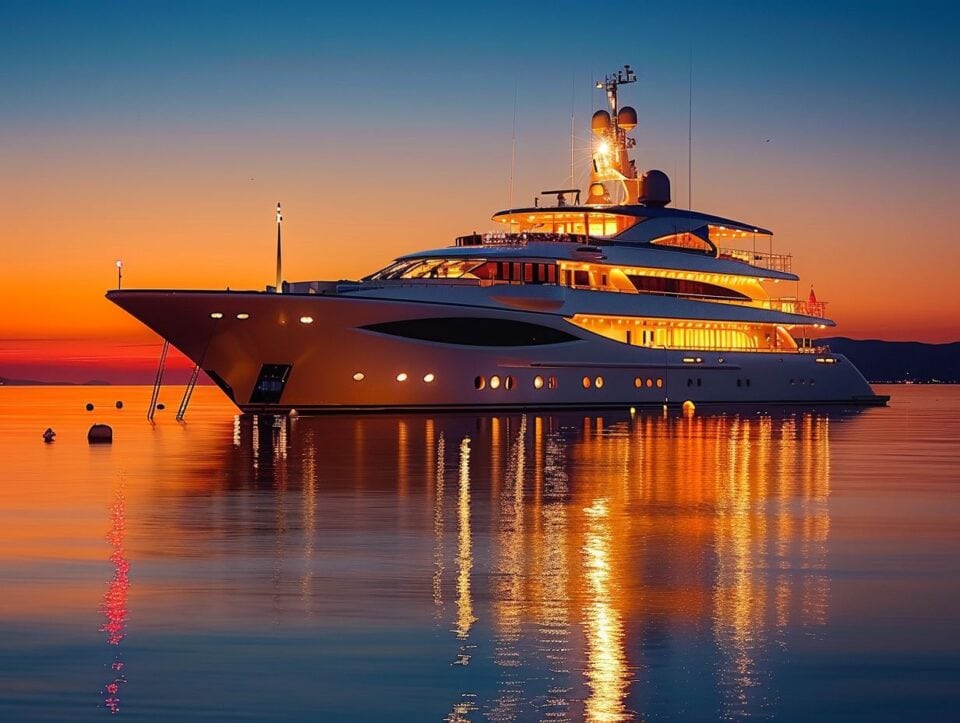4S Sailing: Luxury Yachting Adventures with Unmatched Security
4S Sailing provides luxurious sailing adventures around the beautiful Greek Islands, prioritizing safety and security. Our focus is on implementing comprehensive safety measures aboard luxury yachts, such as maritime vessel security plans, ship security officers, and crew safety protocols to provide an unparalleled sailing experience.
We extend our security considerations to on-shore activities, private jet transfers, anti-piracy measures, and close protection services to guarantee the safety and comfort of our guests on their grand sailing adventures.
Key Takeaways:

- Superyacht security is a complex and crucial aspect of owning a luxury yacht, with measures in place to protect the vessel, crew, and passengers.
- Close protection services and executive security are essential for luxury yacht owners, ensuring their safety while on board and during private jet and airport transfers.
- Anti-piracy measures, including security risk assessments and ship security officers, are necessary for the protection of high-value assets on luxury yachts.
- 4S Sailing offers an unparalleled combination of luxury and security, making every sailing adventure a safe and memorable experience.
Luxury Yacht Security Measures
Luxury Yacht Security Measures encompass the policies and procedures implemented to ensure a secure environment for luxury yacht vessels, their crew, and passengers during maritime travel. This includes utilizing cutting-edge security technology and establishing security protocols and practices to address potential threats.
Given the significant monetary and personal value associated with luxury yachts, security holds paramount importance in the yachting industry. Security companies specializing in yacht security offer tailored solutions to safeguard luxury yachts, including 24/7 monitoring, access control systems, surveillance equipment, and on-board security personnel.
These security measures form part of voyage security and anti-piracy strategies essential for navigating high-risk waters, involving route planning, crew security training, and the deployment of technology-driven solutions like radar systems and satellite communication systems to prevent and respond to security incidents.
Overview of Superyacht Security
Superyacht Security Overview encompasses a wide range of specialized services and strategies aimed at safeguarding superyachts from maritime crime and security threats. These services involve the creation of security plans, conducting risk assessments, and implementing proactive measures to address vulnerabilities effectively.
Maritime consultants play a crucial role in enhancing the security of superyachts by conducting threat assessments and designing security strategies tailored to the specific needs of luxury vessels. Leveraging their expertise in maritime security protocols, they assist yacht owners and operators in developing comprehensive security plans that encompass physical security, technological solutions, and crew training. Through thorough risk assessments, they identify weaknesses and implement proactive measures to mitigate risks and ensure the safety of the vessel and its occupants.
Maritime Vessel Security Plan
Maritime Vessel Security Plans are developed based on detailed risk assessments, the formulation of security plans tailored to those assessments, and the implementation of concrete security measures to safeguard maritime activities. Effective voyage planning assists in anticipating security issues.
Risk assessments offer a comprehensive insight into the vulnerabilities and threats encountered by maritime vessels. By accurately identifying these risks, security professionals can devise security measures that mitigate their impact and enhance overall preparedness.
Security audits are utilized to evaluate the effectiveness of current security measures and pinpoint areas for improvement. The recommendations derived from these audits serve as a roadmap for enhancing security measures and ensuring compliance with industry regulations and standards.
Strategic voyage planning, when complemented with robust security plans, serves to safeguard vessels from potential threats and optimize operations by minimizing risks during voyages.
Ship Security Officers (SSO)
Ship Security Officers (SSOs) play a crucial role in coordinating ship security, ensuring compliance with Best Management Practices (BMP) requirements, and upholding international maritime law provisions. SSOs possess the professional expertise and training necessary to effectively implement security measures on board a vessel. Their responsibilities include conducting security assessments, devising security plans, and facilitating security drills to prepare crew members for potential threats.
A solid grasp of security protocols, emergency procedures, and communication strategies is essential for SSOs. Working closely with the ship’s master, crew, and relevant authorities, SSOs promptly and effectively respond to security incidents. The vigilance and rapid response of SSOs significantly contribute to the safety and security of the vessel and its passengers.
Crew Safety & Security

Ensuring Crew Safety & Security involves providing security training, anti-piracy techniques, and personnel trained in trauma medicine in accordance with the International Ship and Port Facility Security (ISPS) Code.
Measures are implemented to prevent stowaways and safeguard the crew. Crew safety is a paramount concern in maritime operations, with security protocols playing a crucial role in ensuring the well-being of both the crew and the company’s assets.
Security training equips crew members with the knowledge and skills to identify and respond to security threats effectively. Anti-piracy techniques, such as onboard security teams and vessel fortification, are essential for deterring and defending against pirate attacks.
The ISPS Code, established in 2004, addresses security issues in the maritime sector by setting out specific security requirements for ships and ports. Compliance with the ISPS Code ensures that vessels adhere to international security standards, complementing existing safety measures.
Having crew members trained in trauma medicine enhances a vessel’s emergency response capabilities, enabling prompt and appropriate medical assistance during critical incidents.
On-Shore Security
On-Shore Security encompasses a range of protective measures addressing security threats and vulnerabilities occurring on land. These measures include conducting security surveys, implementing tailored security solutions, and engaging security consultancy services. These security protocols are vital not only for safeguarding physical assets but also for protecting intellectual property and ensuring the safety of personnel.
Security surveys, a fundamental aspect of on-shore security, involve a comprehensive evaluation of existing security measures, identification of weaknesses, and provision of recommendations for enhancements. Consultancy services assist organizations in adhering to best practices and regulatory requirements. Customized security solutions, tailored to meet specific needs and address vulnerabilities, help mitigate potential threats and enhance overall security resilience.
Private Jet & Airport Transfer Security
Private Jet & Airport Transfer Security encompasses secure journey management, aviation transfer security measures, and private jet and airport access control to ensure the safe and secure transition of passengers and crew between luxury yachts, private jets, or airports.
Journey management and aviation transfers involve the planning and coordination of aviation-related transportation services. Journey management entails meticulously planning every aspect of travel from departure to arrival to ensure a smooth transition to the next leg of the journey. Aviation transfer security measures encompass various travel security protocols for passengers and crew, such as background checks, baggage screening, and onboard security personnel, along with airport access control to prevent unauthorized entry into secure areas.
These security measures include background checks for passengers and crew, baggage screening for hazardous items, and onboard security personnel for added protection. Access control measures involve restricted entry points, identification verification procedures, and other security measures to prevent unauthorized access to secure areas.
Anti-Piracy Measures
Anti-Piracy Measures involve the implementation of advanced security systems, counter-piracy solutions, and live firing certification for security personnel to adhere to the ISPS Code. Vessel hardening techniques, including barriers and secure rooms, along with the deployment of armed security teams, are commonly employed in the maritime industry as anti-piracy measures. Technologies such as LRADs and thermal imaging cameras enhance situational awareness and response capabilities. The certification of Maritime Security Operators (MSOs) validates the competency of security personnel, contributing positively to anti-piracy efforts. Adherence to the ISPS Code is crucial for ship operators and port facilities to reduce the risk of piracy and promote a secure maritime environment.
Security Risk Assessments
Security Risk Assessments are essential for identifying vulnerabilities and threats, conducting security audits, and making tailored security recommendations to strengthen overall security and readiness. These assessments evaluate an organization’s infrastructure, systems, and processes to provide a comprehensive picture of current security systems and potential weak points.
Audits and security assessments are used to systematically analyze and evaluate an organization’s access controls, data protections, and network securities to identify weaknesses. The recommendations that result from audits offer specific steps to mitigate identified risks and enhance an organization’s security posture.
It is crucial to implement the security recommendations and solutions from these assessments and audits to strengthen the security posture and reduce the likelihood of security incidents and breaches.
Close Protection Services

Close Protection Services involve deploying highly trained personnel to provide close security detail and proactively mitigate potential security threats and vulnerabilities. These services offer a proactive approach to ensuring the safety of individuals in high-threat environments.
Close protection services collaborate closely with clients to evaluate their specific security requirements and vulnerabilities, and develop strategies to address these concerns. This may involve conducting advance security assessments, implementing secure transportation protocols, and coordinating with local security and emergency response organizations to enable a swift and effective response to emergencies.
By maintaining continuous monitoring and intelligence gathering, such services can anticipate potential threats, enabling individuals to carry out their daily activities with confidence and peace of mind.
Executive Security
Executive Security is a collection of specialized security services and protocols designed for high-profile individuals and executives. It involves the provision of specialized security services, solutions, and recommendations aimed at ensuring the safety, security, and privacy of high-profile individuals.
These security services are strategically crafted to mitigate various risks such as physical harm, kidnapping, cyber threats, and reputational damage that high-profile individuals often face. Security experts can provide protection against these risks by conducting vulnerability assessments and crafting customized security plans that may include close protection teams, advanced surveillance technology, secure transportation, and protected residences.
Regular security assessments and continuous monitoring play vital roles in identifying and addressing any emerging threats promptly, thereby ensuring the ongoing protection of the individuals.
High-Value Asset Security
High-Value Asset Security involves protecting valuable assets through comprehensive security surveys, the development and implementation of tailored security solutions, and the identification and mitigation of potential vulnerabilities to safeguard valuable possessions and properties.
By conducting security surveys for high-value assets within an organization, a thorough analysis of vulnerabilities can be conducted, aiding in the creation and execution of customized security measures aimed at addressing and reducing the risks identified during the survey.
Proactive measures, such as regular security assessments and audits, play a key role in thwarting potential threats and enhancing the overall security of assets. Timely addressing of vulnerabilities is crucial for upholding the secure protection and integrity of valuable assets against potential security breaches or unauthorized access.
Frequently Asked Questions
What are the security measures implemented on high-end luxury yachts?
High-end luxury yachts have various security measures in place to ensure the safety and privacy of their guests. These may include CCTV cameras, motion sensors, and advanced alarm systems.
Are luxury yachts equipped with security personnel?

Yes, most high-end luxury yachts have a dedicated team of security personnel on board to monitor and protect the yacht and its guests.
Do luxury yachts have safety procedures in case of emergencies?
Absolutely. Luxury yachts are required to have strict safety procedures in place for emergency situations, such as fire, medical emergencies, or a security threat.
What measures are taken to ensure the confidentiality of guests on luxury yachts?
High-end luxury yachts prioritize the confidentiality of their guests and have strict confidentiality agreements in place with their crew. Additionally, access to guest information is limited and closely monitored.
Are there restrictions on bringing personal security on board high-end luxury yachts?
While some luxury yachts may allow guests to bring their own personal security, it is ultimately up to the discretion of the yacht’s owner. However, most luxury yachts have their own trained security personnel on board.
What are the procedures for screening guests and their belongings before boarding a luxury yacht?
Prior to boarding, guests and their belongings are thoroughly screened to ensure the safety and security of everyone on board. This may include bag checks and metal detector screenings.


